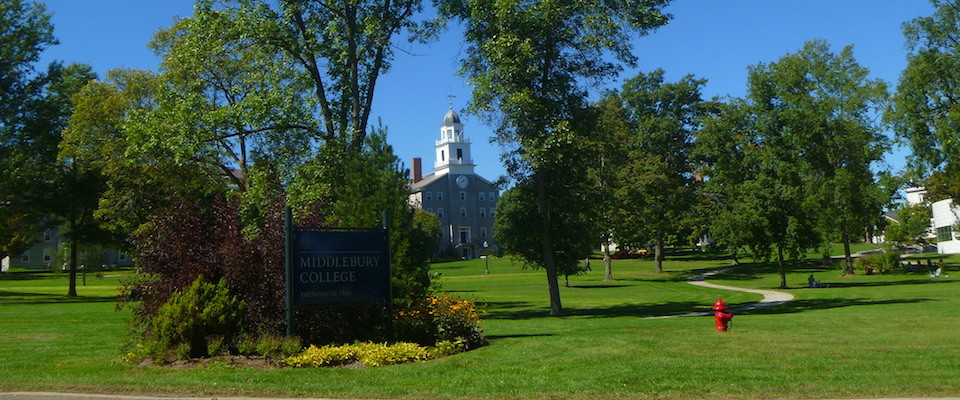
The invitation from Middlebury College to speak about my book The Demon in Democracy came last year. I was pleased to receive it…
Source: The Demon in Middlebury by Ryszard Legutko | Articles | First Things
This just isn’t funny anymore, if it ever was.
I used to like Middlebury College; heck, I used to want to go there, or teach there, or both. I like Vermont. I like the town of Middlebury. I especially like the “secret” recipe for a maple syrup vinaigrette that I got from someone there, during my brief stint teaching outdoor education nearby! But I do not like what Middlebury College has become.
This is from Ryszard Legutko, author of the book The Demon in Democracy, which I referenced in a previous post, but have not yet had the chance to read. Now I want to, all the more! Because there is a demon lurking at the heart of liberal democracy, one whose existence is unsuspected by many, studiously ignored by others, and actively fed and worshiped by some. And I am not sure that I am using that term entirely metaphorically!
At any rate, Legutko comments, inter alia, on the socialist-fascist-cultural Marxist mess our academic world has become; and he does so using Middlebury as his personal example, since the college soviet unloaded on him, there. I will let you read his account of the incident in question! But he follows that account with this analysis:
“By comparing the clichés with the realities they supposedly describe, we find that the aim of this language is to reverse the meanings of words. ‘Marginalized people’ are not people who are marginalized, but people who set the college’s agenda and can get away with just about anything, including physically assaulting their professors. ‘Respectful and non-disruptive counter-space’ means subjecting a lecturer to insults and humiliations. ‘Inclusivity’ is the systemic censuring of people and ideas. I don’t know what ‘healing’ is supposed to mean, but I suspect it might refer to the joy a hooligan feels in his acts of vandalism.”
This is precisely the sort of warping of language Orwell tried to warn us about! Newspeak, the memory hole, some animals are more equal than others… but I digress:
“Am I exaggerating? Am I unjust to the students and their faculty mentors, people who may be misguided but are sincere in their desire for a better world? Let us see what their better world would look like. Here is one of the demands that the SGA (Student Government Association) at Middlebury made after the incident:
Any organization or academic department that invites a speaker to campus will be required to fill out a due diligence form created by the Office of Institutional Diversity, Equity, and Inclusion in coordination with the SGA Institutional Diversity Committee. These questions should be created to determine whether a speaker’s beliefs align with Middlebury’s community standards [emphasis added by The Anglophilic Anglican], removing the burden of researching speakers from the student body.
“I learned from this statement that Middlebury has two offices (at least) to monitor diversity, equity, and inclusion at the college. Student activists seem to find it an undue burden to have to do the work of policing invited speakers. They insist that the institution do their bidding. And Middlebury is not an anomaly. Similar bodies are everywhere, at every college, university, and corporation in the U.S. and many European countries, all of them surveilling the words and actions of their members and implementing ideological directives with bureaucratic ruthlessness.”
So, only speakers whose “beliefs align with Middlebury’s community standards” (thank you, Facebook, or as some now call it, Fascistbook) will be allowed on campus? Or if others somehow manage to be permitted, they can expect to experience protest, heckling, or worse? All in the guise of diversity, equity, and inclusion?
Alles klar, Herr Kommisar?
How is this not Communist? Marxist? Fascist? Totalitarian? Did we live through the 20th century, defeating both the Nazis in the Second World War and the Soviets in the Cold War, in vain? Did my father fight and earn the Bronze Star and Purple Heart in the first, and defend our country via signals intelligence in the second, in vain? I begin to fear so, to my deep dismay!
Bear in mind, Legutko is a person who grew up in Communist Poland, having been born there in 1949. He is Professor of philosophy at the Jagiellonian University in Kraków, specializing in ancient philosophy and political theory, and a Member of the European Parliament. He knows whereof he speaks, when it comes to totalitarianism and dictatorship: historically, philosophically, and personally. He continues,
“The growing power of these offices would not be possible without the corruption of language. Diversity, equity, and inclusion have ceased to mean what they always meant and now mean the opposite. They now mean rigidity, dogmatism, conformity, intimidation, control, arbitrariness, and censorship. The offices of diversity, equity, and inclusion are in fact guardians of the regnant ideology — ‘Middlebury’s community standards’ — and their job is to censure all ‘beliefs’ that do not ‘align; with those standards. In Orwell’s world, war was peace, freedom slavery, and ignorance strength. At Middlebury, diversity is monopoly, equity bias, and inclusion censorship.”
So now we have student soviets, sitting in judgement on both their professors (most of whom are cultural Marxists themselves, anyway, and most of the few who aren’t, are – understandably, it must be confessed – interested in protecting their jobs, their incomes, and their families’ futures), and on anyone who might be invited to speak to them?
What can we call these, other than academic soviets? How did we allow colleges and universities to become neo-bolshevik? What happened to academic freedom, to freedom of inquiry? What happened to a challenging intellectual environment (for anyone other than conservatives and traditionalists, who are to be actively ghettoed)?
I knew the situation was bad, and getting worse. I knew it was already heading in that direction when I was last directly involved with the academic world, in the mid-1990s; and I knew it had only tanked still further since. But I have to admit, even I did not know it was this bad. Heaven help us.
The only bright spot is Legutko’s concluding paragraph. I am tempted to reproduce it here, but I shall refrain: better you should read the whole article!











You must be logged in to post a comment.